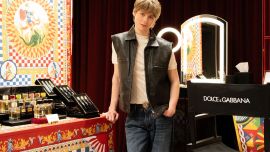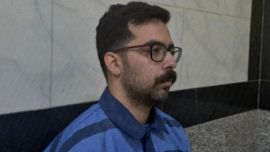Several members of my family spent much of their lives in banks. Banks were seen as cosy, a safe slot in which to spend three or four decades.
My family brought me up to believe that banks were noble institutions, especially British banks here that offered steady jobs to English-speaking school leavers. This referred to the Bank of London and South America, later Lloyds.
Another such opportunity was in the Royal Bank of Canada. Those knowledgeable in the family thought that banks had the very appearance of reliable venues that looked after our money (the money of some, presumably). In spite of these assurances, however, I never really fancied a job in a bank.1
No banks. So when 19, I dropped into the Anglo meat-packing company, in South Dock, Avellaneda. Anglo was a local pit, inaugurated by president Marcelo Torcuato de Alvear in 1928, in his last months in office. Alvear would visit occasionally from home in Paris you see and do all the necessary inaugurating. Anglo was not a bank, though it was still a destination of easy work for British expats, a safe outfit for the enterprising, as well as society’s dropouts.
It was one of the most interesting places I’ve ever had the luck to spend some time in. The Anglo meat company was starting to slide when I joined in 1963. Probably before that truth be told as international markets and local finances wobbled. Anglo was a seedy plant with offices on the banks of the filthy Riachuelo, then in use by small ships and river freighters. For the entertainment of some staff, there was the mooring at the South Dock of Royal Mail Line ships to load chilled beef sides and frozen quarters and satisfied smugglers of small volumes of perfumes, cigarettes and spirits. But the real pleasure was to board these ships while loading and get a few drinks at the bar. The Vestey family’s Blue Star Line freighters had a limited capacity for passengers and good bars.
It was not my job, as a trainee auditor, that had any attraction but the acquaintance with the human element, with the managers whose lives hinged on “home leave” every four years and looked forward to a handshake with one of the owners, one of the Vestey brothers. I never knew the brothers. They were known for low wages and avoidance of United Kingdom tax, by keeping their books in Fray Bentos and a management trust in Paris.2
The brothers, Sir Edmund and William Lord Vestey were well known in the British Pariliament, for their exemplary meanness (even though they part financed restoration of Liverpool Cathedral). On one occasion in the House of Lords, then as a reporter invited for tea or something early in my London residence, I was asked where I came from. “Argentina,” I said, and immediately heard the remark, “Oh, Vestey made his many fortunes there.” Then came the follow-up. “Do you know that in the House here they say that Vestey is so tight you couldn’t get a razor down the crack in his arse.”
Anglo-sur-Sludge felt as a Dickensian unit must have looked and seemed. In the 1970s, I was reminded of Anglo when seated at the Victorian desktops used by the down-table subeditors on the Daily Telegraph, in London’s Fleet Street.
Junior as I was at the Anglo, it was my turn to stay late on some Fridays and tour the cold storage rooms where permafrost had set over four decades. The tour was a precaution that no inebriate individual had stayed in a chamber for a rest. Men crossed the Riachuelo to one of the “cantinas” and there, they were served red wine in the small (then the only size) Coca Cola or Bidú bottles their lunch. These “soft-drink sippers” later crossed back to the plant for a siesta.
At times, we watched from the south side as these men were rowed over from the Vuelta de Rocha in very small wooden craft. We laid bets in the hope somebody would fall in the water.
Nobody ever fell. When touring the cold stores, equipped with a large flashlight, I had an escort.
Still, I was terrified of what I might find. A stone cold Alfie Smith, for example, would probably be stone hard by Monday. Apparently there had been one, only one, cold casualty years before.
But management had decided that the Friday patrols had to continue. I did not stay long at Anglo, because I soon found a more elegant office on Paseo Colón with better pay. But that did not last either. I had decided that I wanted to be a journalist, a writer.
One of my aunts asked me why I did not get a real job, available to “young men like you.” She meant a bank. It was a blessing she did not tell me what I was ‘like.’ Once, when I repeated the wish to be a journalist, the same aunt said that I would soon learn from “nice people” that such employment was disreputable. The community would cold-shoulder me, I was informed by my aunt (my early life was very much influenced by aunts). People said it was well known that community failures went to work in the Accounts Department at the British Hospital, or on the sports desk at the Buenos Aires Herald. The former sounded too much like a bank. The latter became my second home for several decades.
“You’ll never be invited to tea at the British Embassy like that,” my aunt assured me.
1 The Bank of London and South America (BOLSA) operated in Buenos Aires between 1923 and 1986. It was acquired in part by Lloyds in 1918. It became part of Lloyds International in 1986. Lloyds in Argentina was sold to Banco Patagonia in July 2004.
2 Frigorífico Anglo and its distribution company, Ciabasa, operated in South Dock until about 1974.

























Comments